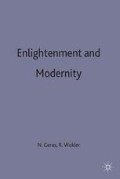Abstract
One of the last writings Foucault was able to complete before his death in June 1984 was an essay entitled ‘What is Enlightenment?’ This was meant to be delivered at the University of California, Berkeley in the spring of 1984 as part of a seminar on modernity and the Enlightenment whose participants would have included Jürgen Habermas, Charles Taylor, Richard Rorty, Hubert Dreyfus and Paul Rabinow. The seminar never took place, due to Foucault’s death, and the essay thus became a sort of testament of Foucault’s stance toward the Enlightenment and, more specifically, toward Kant’s answer to the question ‘Was ist Aufklärung?’ formulated in 1784 in the pages of the Berlinische Monatsschrift. But Foucault’s interest in Kant’s answer to the question ‘What is Enlightenment?’ went back at least a decade. He had in fact composed an article entitled ‘Qu’est-ce que la critique? [Critique et Aufklärung]’ which was delivered as a lecture before the Société française de Philosophie in May 1978, and devoted the opening lecture of a course at the Collège de France in 1983 to an assessment of Kant’s essay on the Enlightenment and his attitude to the French Revolution.2 In these essays Foucault presented what may be called a qualified defence of the Enlightenment, in particular, of its critical attitude to the present which he termed a ‘philosophical ethos’.
Foucault saw himself as perpetuating the principle whereby philosophers “enlighten” their present, which Kant introduced in his classic 1784 paper that defines Enlightenment as an emancipation from self-imposed “immaturity.” But while Foucault may have tried to enlighten our present, he was hardly a figure of the Enlightenment. Indeed he is often taken as the great modern counter-Enlightenment philosopher and historian. More precisely, Foucault’s nominalism is directed against the universalism of the Enlightenment … In reversing, dispersing, and criticizing what was taken to be universal, Foucault attacks what, in the present, has come to be regarded as the Enlightenment.1
Access this chapter
Tax calculation will be finalised at checkout
Purchases are for personal use only
Preview
Unable to display preview. Download preview PDF.
Notes
John Rajchman, Michel Foucault: the Freedom of Philosophy ( New York: Columbia University Press, 1985 ), p. 59.
R. Bernstein, ‘Foucault: Critique as a Philosophic Ethos’, in Critique and Power, op. cit., pp. 211–41, at pp. 222, 227.
T. McCarthy, ‘The Critique of Impure Reason: Foucault and the Frankfurt School,’ in Critique and Power, pp. 243–82, at pp. 259, 272.
Charles Baudelaire, The Painter of Modern Life and Other Essays, trans. J. Mayne ( London: Phaidon Press, 1964 ), p. 13.
T. McCarthy, ‘The Critique of Impure Reason: Foucault and the Frankfurt School’, in Critique and Power, p. 269.
Editor information
Editors and Affiliations
Copyright information
© 2000 Palgrave Macmillan, a division of Macmillan Publishers Limited
About this chapter
Cite this chapter
d’Entrèves, M.P. (2000). Critique and Enlightenment: Michel Foucault on ‘Was ist Aufklärung?’. In: Geras, N., Wokler, R. (eds) The Enlightenment and Modernity. Palgrave Macmillan, London. https://doi.org/10.1057/9780333983300_10
Download citation
DOI: https://doi.org/10.1057/9780333983300_10
Publisher Name: Palgrave Macmillan, London
Print ISBN: 978-1-349-40355-4
Online ISBN: 978-0-333-98330-0
eBook Packages: Palgrave Political & Intern. Studies CollectionPolitical Science and International Studies (R0)

